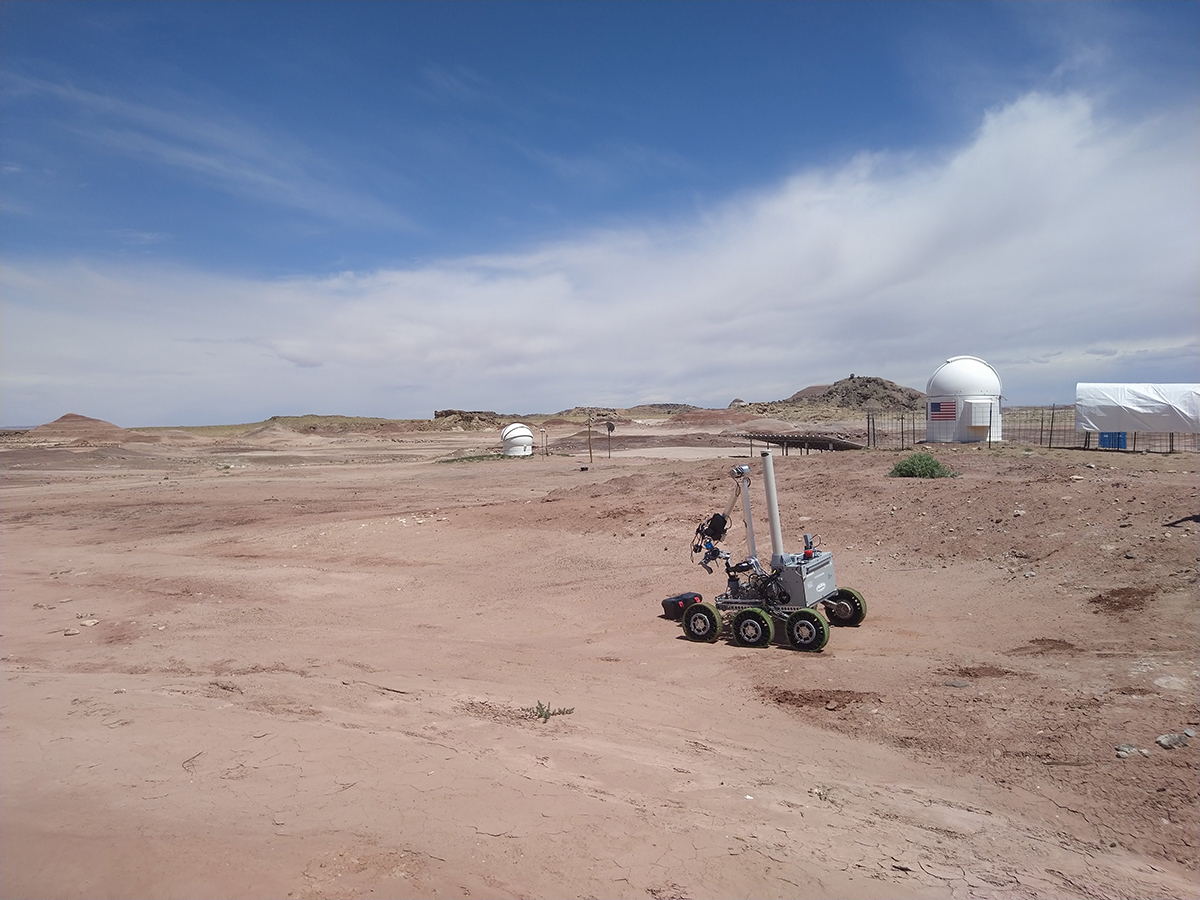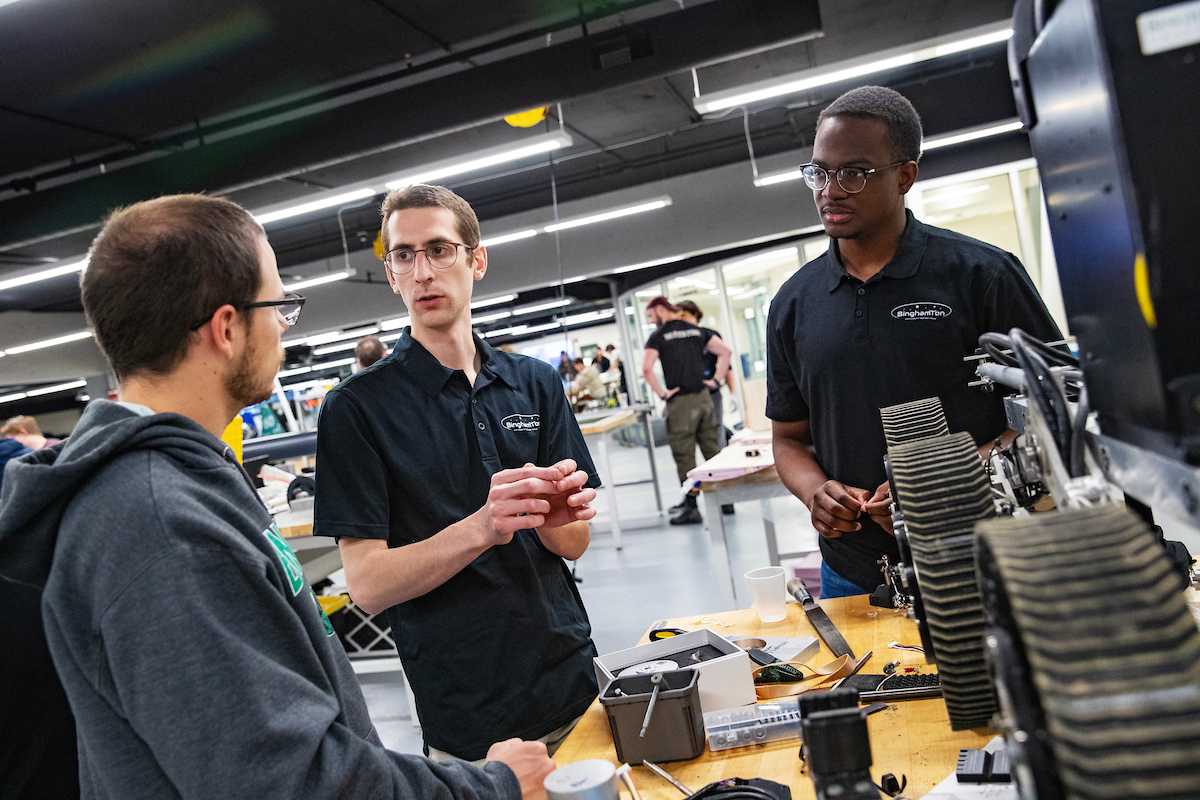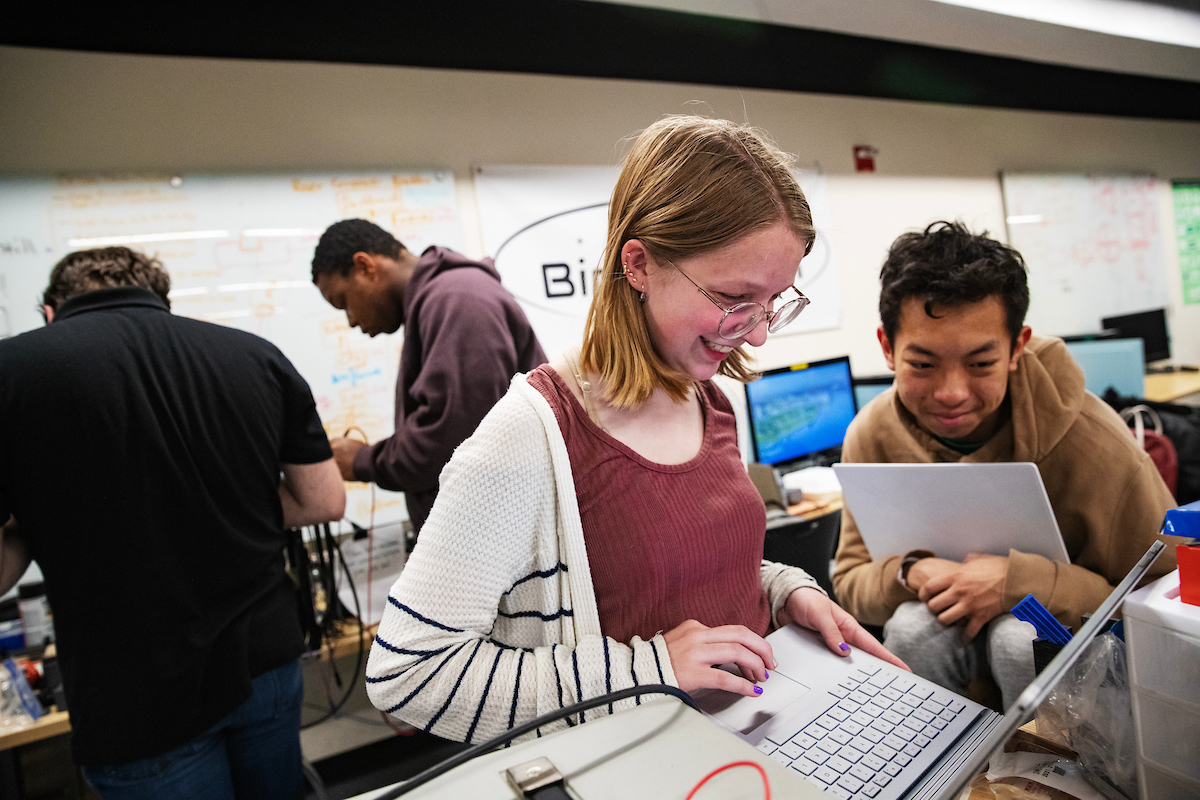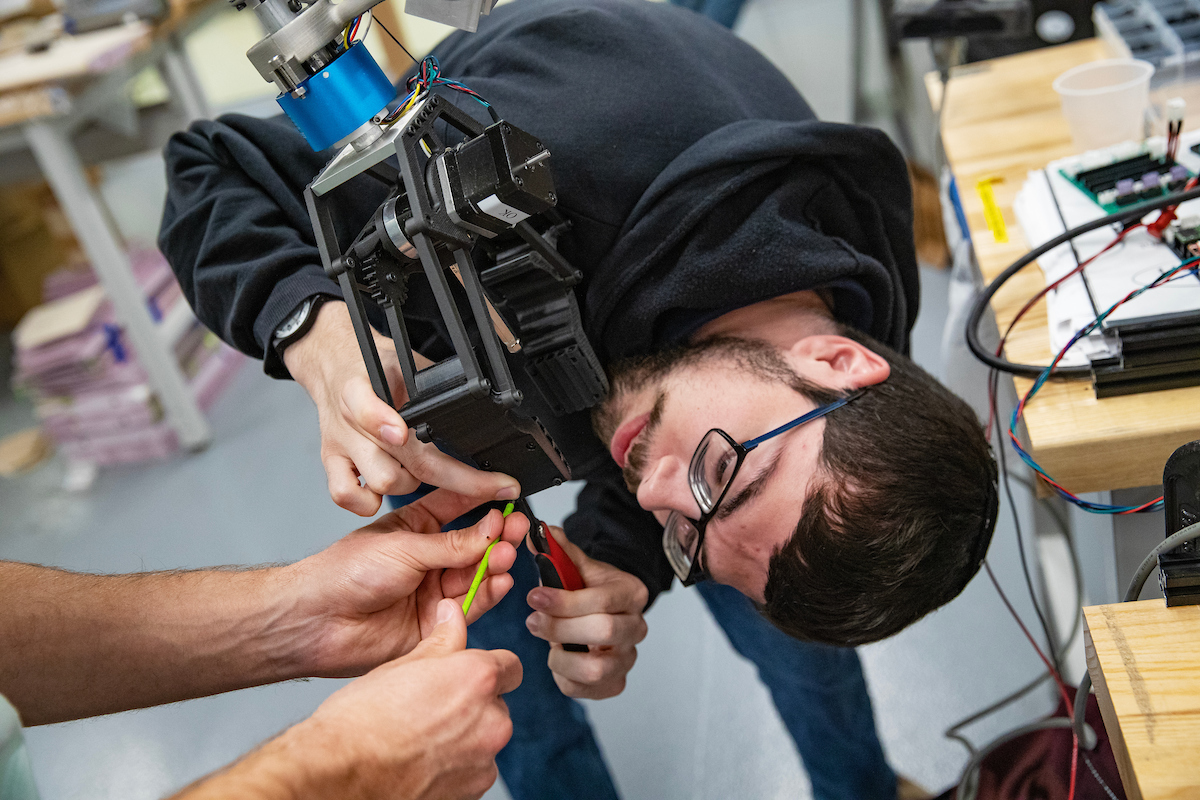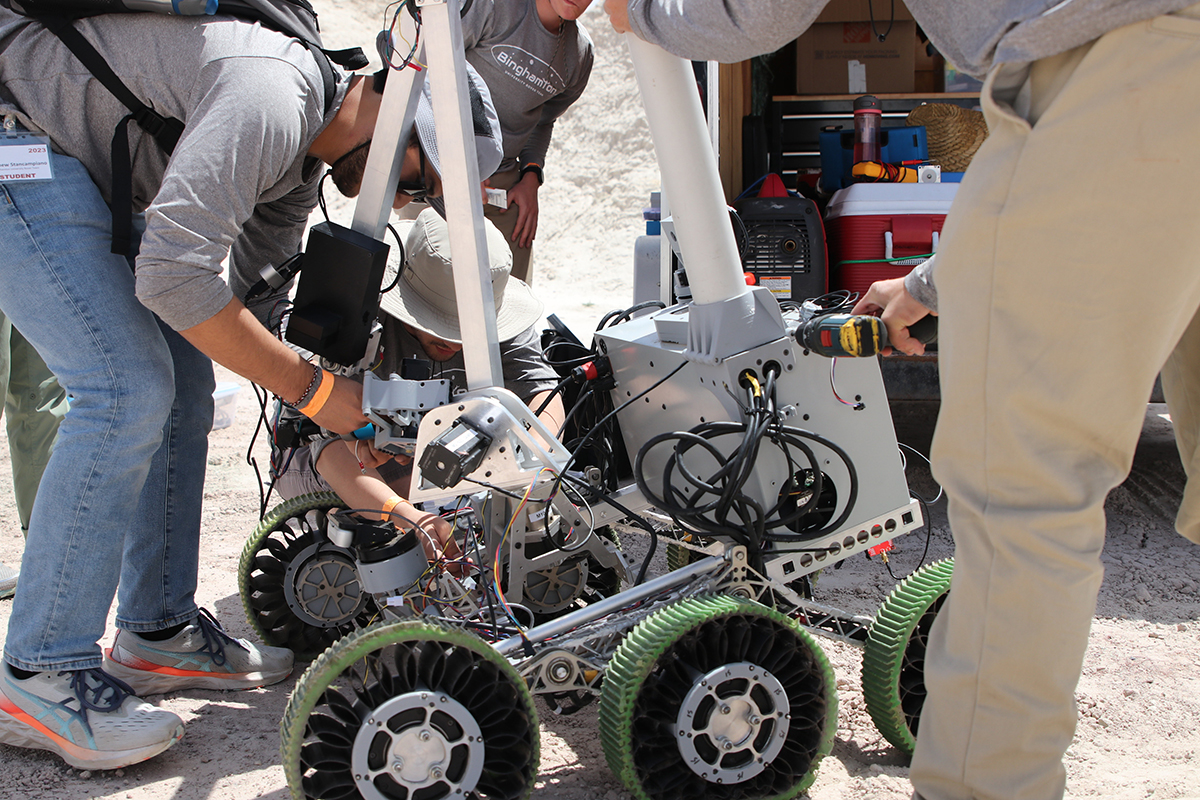Rover Team competes in international finals for first time
Judges chose Binghamton as one of 37 finalists among 104 teams from 15 countries
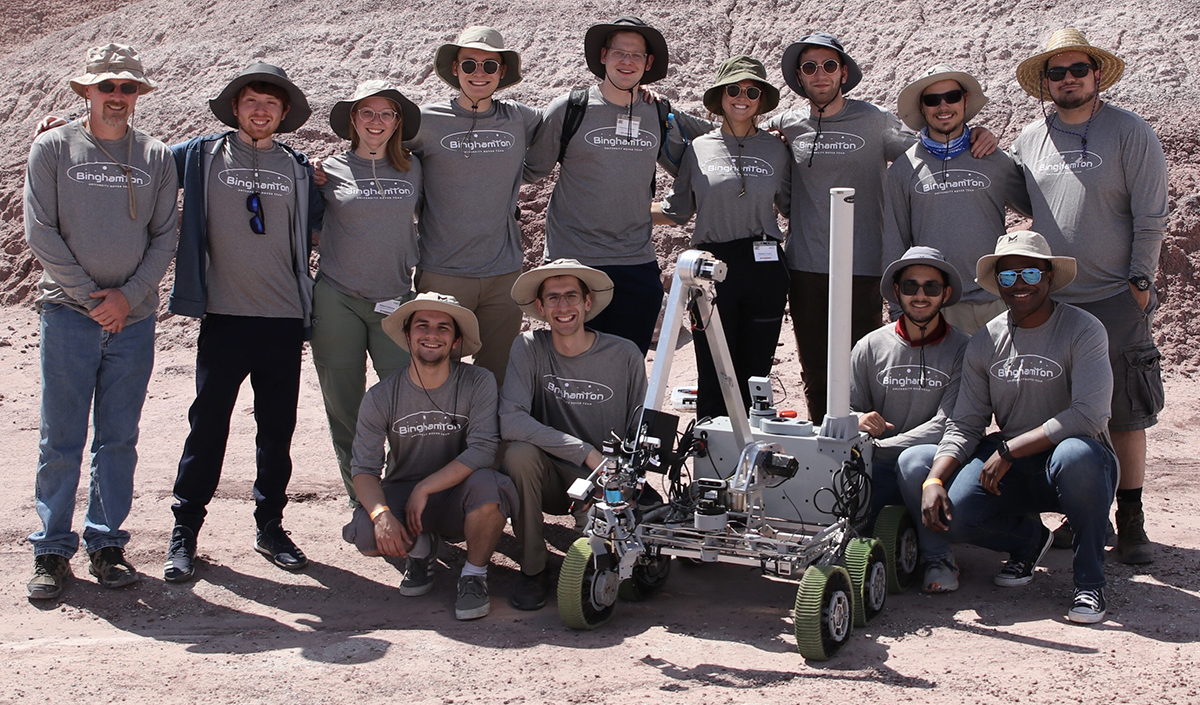
Deep in the Utah desert more than an hour outside Hanksville (population 220), the terrain is dry, rocky and harsh as far as the eye can see. The average high temperature in June under the unforgiving sun hovers around 95 degrees, and the amenities are very few.
It’s not exactly a vacation destination, but the brutal conditions make it the perfect place for the University Rover Challenge, which brings together college students from around the globe every year to decide who can make the best vehicle to survive on Mars or similar alien planets.
For the first time, the Binghamton University Rover Team went to Utah for the final round of the competition, which is organized by the nonprofit Mars Society. From May 31 to June 3, team members demonstrated their rover’s abilities in several tasks that are essential to exploring other worlds.
Judges chose Binghamton as one of 37 finalists among 104 teams from 15 countries, beating out schools such as Lehigh University, University of California – Berkeley and Georgia Tech to be in the finals. After four days of competition, the Binghamton team came in 23rd place — a respectable outcome that future members can build on.
“The team [members] worked tirelessly from the moment they arrived in Utah right up to the end,” said Professor Douglas Summerville, MS ’94, PhD ’97, chair of the Department of Electrical and Computer Engineering (ECE) and team advisor who traveled with them to Utah. “Each day, they drove out to the competition site in the desert, and after returning they set up a makeshift lab in a local park to work on the rover for the next day’s events.
“Most nights they worked well past midnight, and some days they set up and broke down the ‘lab’ before and after competition. They fabricated parts in their hotel rooms, soldered boards in the park, rebuilt gearboxes by flashlight and used every free moment to improve their rover. It was amazing to watch.”
The Rover Team started as a capstone project for seniors at the Thomas J. Watson College of Engineering and Applied Science, but it has operated as an independent, student-run group for the past four years. Although many members are from Watson College, students from disciplines all over campus take part in the project.
During a visit this spring to the Fabrication Lab, a student workspace located on the first floor of the Engineering Building, chief engineer Zev Blumenthal ’23 and technical project manager Evan Knobler ’23 explained some of the guidelines for the rover competition: The entry can’t weigh more than 70 kilograms or cost more than $22,000, and it must fit inside a 1.2-meter cube.
There are four main tasks that judges will scrutinize to score the competitors and determine a winner. One is the ability to find a predetermined location autonomously, using cameras and sensors to traverse that journey without bumping into things or getting stuck. Another is the science system that needs to collect and analyze soil samples for chemical composition or signs of microscopic life. The third is building a robot arm that must manipulate different objects such as a drawer, a keyboard and a series of switches to show its ability and dexterity. The final one is using the arm to retrieve and deliver large objects such as rocks and toolboxes.
Before the organizers of the University Rover Challenge invite schools to the finals, the teams must submit preliminary designs for review in December, receive feedback and then submit a video in March showing their rovers’ capabilities traversing different situations.
Judges scored Binghamton 91.85 out of 100 based on the video submission and other documentation, which is up around 20 points from 2022’s result. Blumenthal believes the Rover Team might have made it to the finals sooner if not for the difficulties of working on the rover during the COVID-19 pandemic.
“Our team this year really focused on getting to competition,” he said. “The next few years are going to be focused on refining that. I’ve talked with the future leadership [for the Rover Team] that they should work on maybe taking one system next year and totally revamping that. The goal is not to build from scratch every year because you run into a lot of risk that way, and on a student team you have to manage risk for reward.”
The organization of the Rover Team is similar to a tech startup, divided into six sub-teams: project and operations management, software, human-robot-environment interaction, environmental analysis, electrical and drive system. The team has around 70 students, a number that has steadily increased over the past few years.
Because student-led activities offer the chance to show independence and leadership as well as skills and creativity, Knobler sees them not just as fun challenges but also as resumé-builders for prospective employers.
“All around campus, students are starting to see the benefit of being in projects and organizations like this,” he said. “You see a bunch more students on our team. Last year, we had maybe 40 or 45 members, and now we have closer to 70. The year before that, it was even less, like 30-ish. So every year, you’ll see more students coming on.”
Fourteen team members headed to Utah with the team’s rover entry in tow. COVID-related rules mean that only 12 students per team are allowed on the competition site each day.
None of the Rover Team’s accomplishments would be possible without support from Watson College and the ECE Department as well as sponsors and donors such as Binghamton Institute of Electrical and Electronics Engineers, Lockheed Martin Corporation, IBM Corporation, Zyltech Engineering LLC and Geraldine MacDonald ’68, MS ’73, LittD ’17.
“It’s really cool to be the ones who accomplished getting to the finals and to be able to tell our sponsors, ‘We made it because of what you contributed. We couldn’t do what we do without you,’” Blumenthal said.
Blumenthal and Knobler also credit previous chief engineer Daniel Iacobacci ’22, MS ’23, who continued to advise the team as a graduate student.
“It wouldn’t have been possible without Danny,” Blumenthal said. “He put so much time and effort into the team over the last three years, and that is what propelled us this year. He did a lot of the fundraising and organization of the team structure that we have now. We’ve just been building off of that.”
Even before the University Rover Challenge finals, Blumenthal and Knobler collected their diplomas at Commencement in May, and they have handed the reins of the Rover Team to the next student leadership team. Blumenthal will work at BAE Systems in Endicott while earning a master’s degree part time, and Knobler heads to Columbia University to pursue a master’s degree in electrical engineering.
“It’s bittersweet, but it’s a good place to leave off,” Knobler said. “We have a rover that’s obviously good enough to make it to competition, so I feel comfortable saying, ‘OK, here’s all of our work,’ and handing it off to the next generation.”

